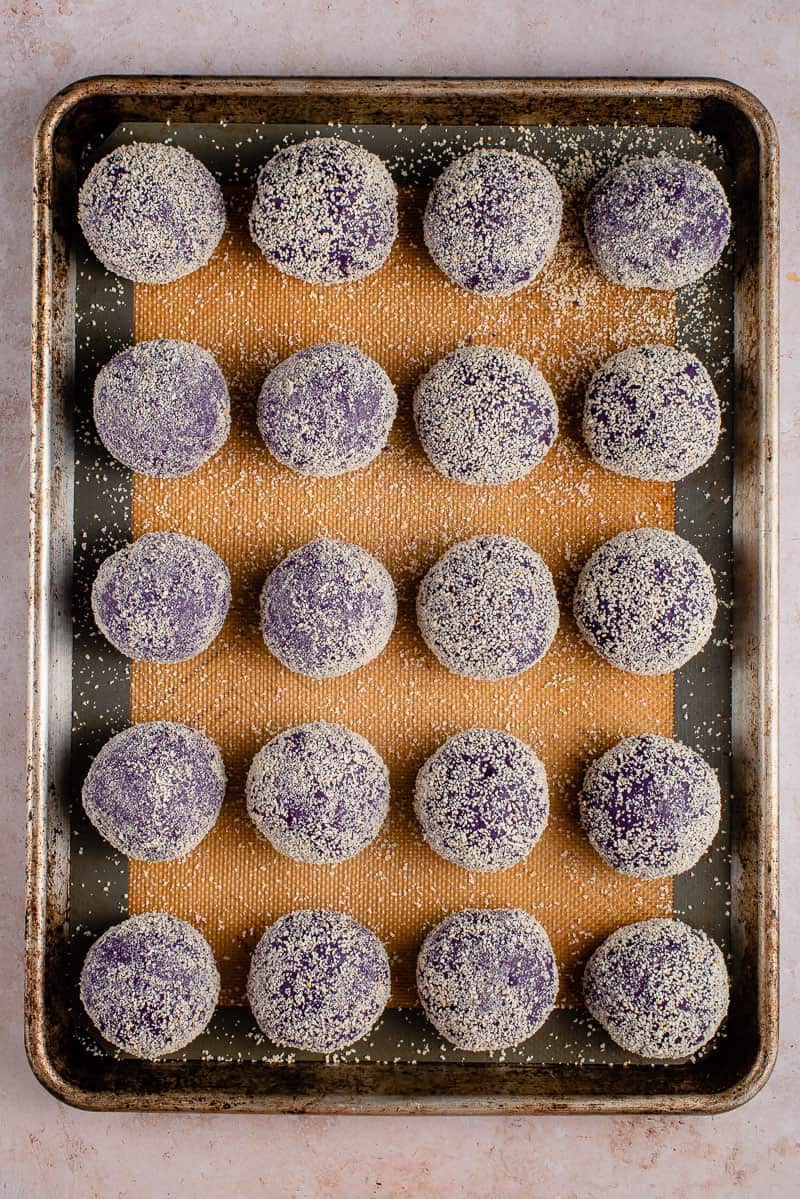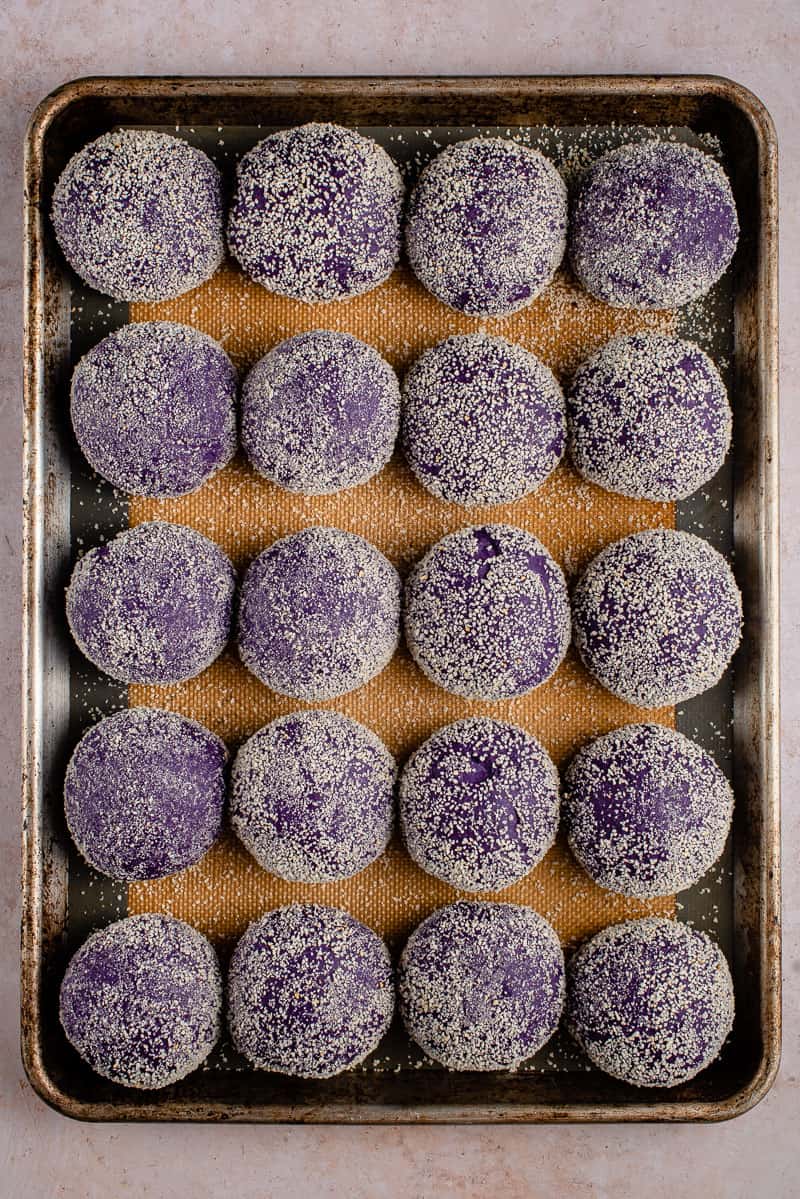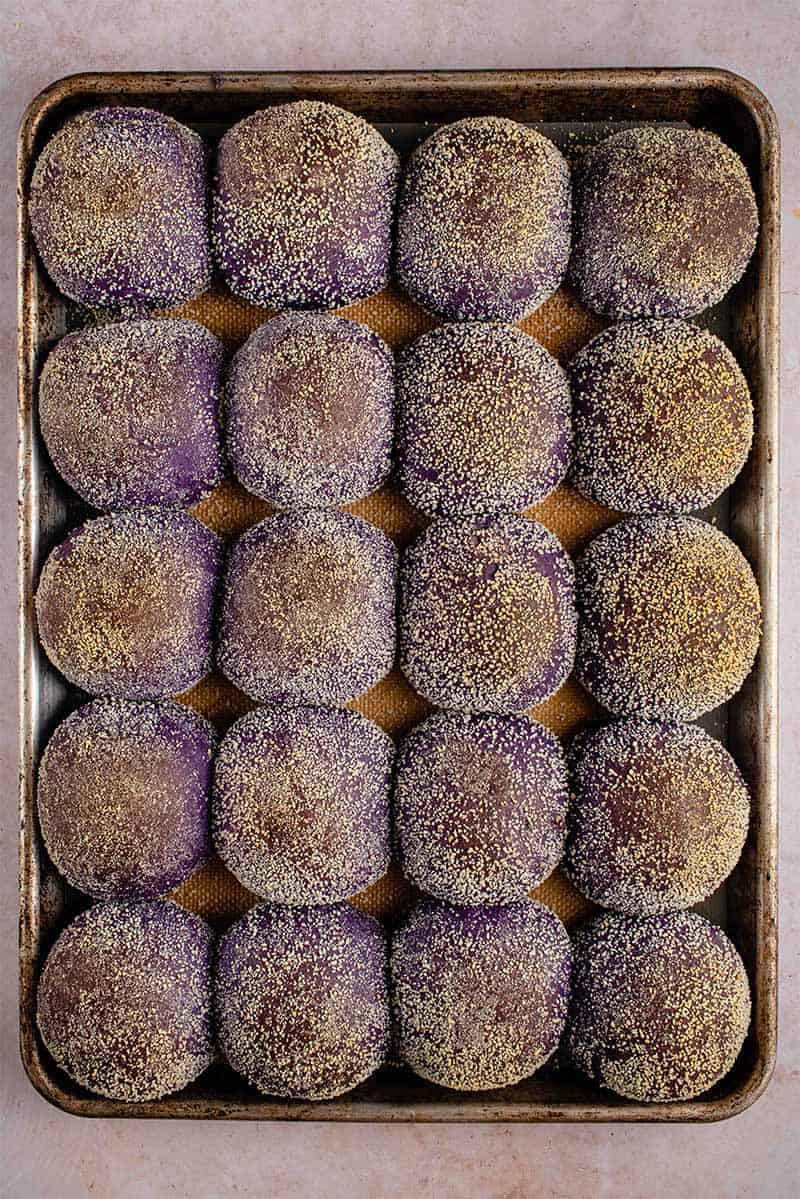Fluffy Ube Pandesal (Filipino Purple Yam Bread Rolls)
Posted by admin on
A Filipino breakfast staple made vegan! This ube pandesal recipe is soft, fluffy, and delicious. Pandesal is great any time of day and can be enjoyed on its own or with sweet or savory fillings.
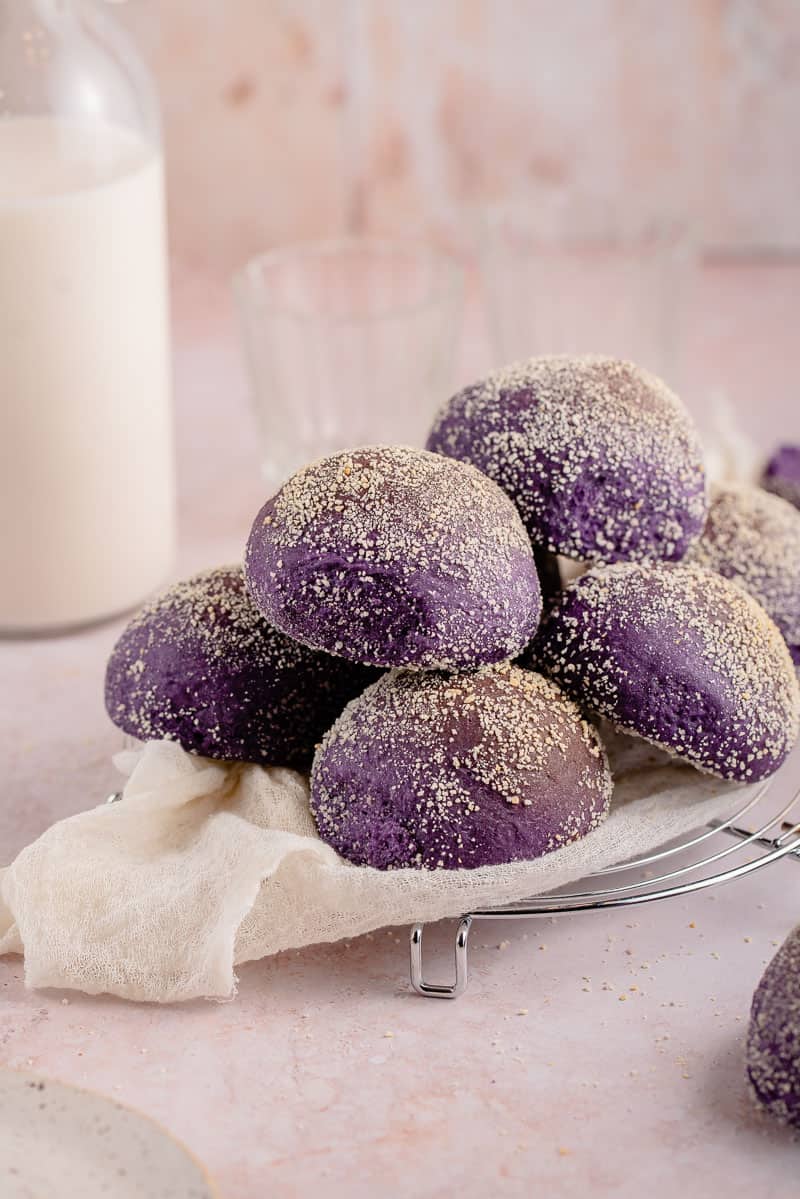
What is Pandesal?
Pandesal (pan de sal) is a popular yeasted bread roll in the Philippines. It is kind of like a sweet dinner roll covered in bread crumbs. Although it is called pan de sal, it tastes slightly sweet rather than salty. Since this recipe is vegan, it is both dairy and egg-free.
What is Ube?
Ube is a purple yam that originated from the Philippines, and it has long been a staple in Filipino cuisine, used in a plethora of Filipino desserts. Ube can be found in various forms, including fresh, frozen, dried, and powdered, and even in ube jam (ube halaya), but today we are sticking to the powdered and extract forms as I felt that it would be the most accessible to our audience.
Ube was such a large part of my childhood, and I am so happy to see widespread appreciation for the ingredient. But, if you haven’t heard of ube, you’re in for a treat! It has a nutty vanilla-like flavor and pairs perfectly with the pandesal.
Ube is often confused with taro but keep in mind that they are 2 different things!
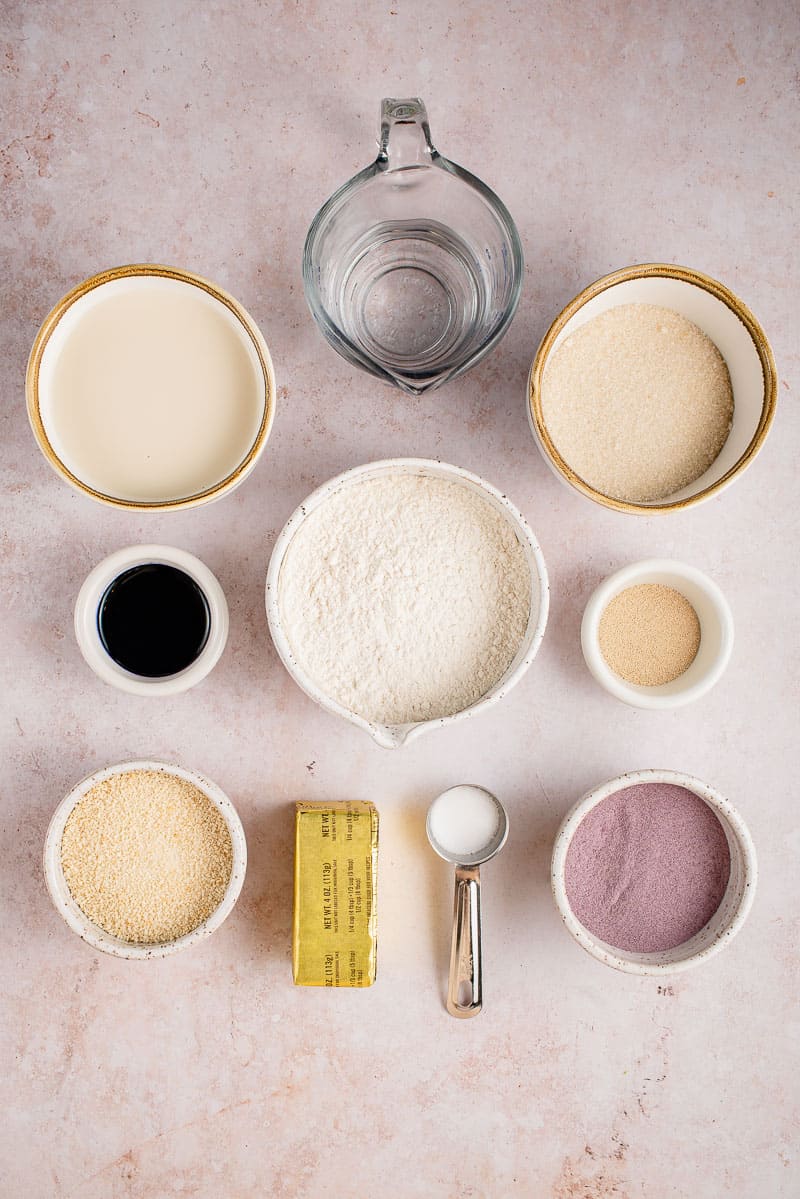
Ingredients You’ll Need
- Warm Water: The temperature should be between 105 and 110°F for proofing.
- Active Dry Yeast: We used active dry yeast which needs to proof separately before mixing with the rest of the ingredients. To substitute instant (or rapid rise) yeast for active dry, use 1 3/4 teaspoons of instant yeast instead of 2 1/4. You do not need to prove the yeast; add it to the dry ingredients. You will need to add more liquid to the dough to get it smooth, about 1/2 cup.
- Granulated Sugar: Used to both activate the yeast and sweeten up the bread.
- Vegan Butter: Enhances the texture, flavour, and moisture of bread.
- Warm Plant-Based Milk: Be sure that it is unsweetened so that your bread is not too sweet.
- Ube Extract and Ube Powder: I purchase both from a local Asian market, but they can also be ordered online here and here.
- Salt: Not only does salt add flavor, but it also works to tighten the gluten strands that are formed, which makes them stronger.
- All-Purpose Flour: We used regular all-purpose, but bread flour should also work.
- Bread Crumbs: Be sure they are fine in texture and that they are vegan. We used this one.
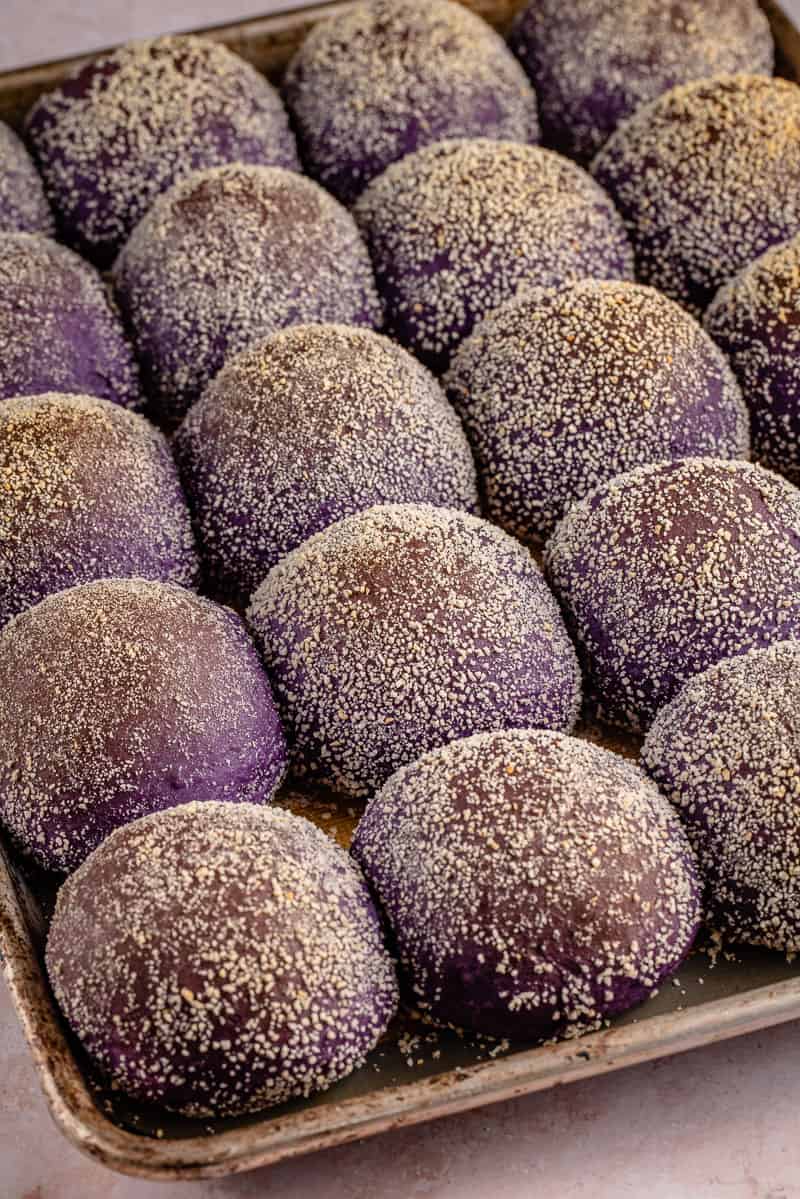
Ube Cheese Pandesal
A popular variation of ube pandesal is ube pandesal stuffed with cubes of cheese! To make this, all you have to do is flatten each dough ball into a circle, add in a 1/2-inch cube of vegan cheese and then roll each into a ball. Be sure to seal the dough tightly, so it does not ooze out. Once it bakes, you’ll be left with a rich, melty cheese filling!
How to Serve Pandesal
Pandesal is most commonly served warm and can be enjoyed as is, dipped in a morning beverage (coffee, tsokolate (hot chocolate), or milk. It can be enjoyed on its own or with a sweet or savory spread of filling. Ideas include vegan butter, vegan cheese, jam, peanut butter, a chocolate spread, vegan eggs, or vegan meat. They are great for sliders, too!
A few tips before getting started:
- If you would like sweeter pandesal, increase the sugar to 1 cup.
- This can also be made in a stand mixer with a dough hook.
- Coconut sugar can be used in place of granulated sugar, but keep in mind that it will create a darker dough/result.
- If you want to make the dough ahead of time, you totally can! Here are two options:1. When you reach step 6, cover the bowl with plastic wrap or a resealable wrap instead of allowing the dough to rise and then place it into the fridge overnight. Remove the dough from the refrigerator, let it come to room temperature, and continue rising (about 1-1.5 hours or so). Once it has come to room temperature, continue with the recipe.2. The second option is to place the dough into the fridge after step 9. Place the rolls onto your pan of choice, cover the pan and place it into the refrigerator overnight. Remove the dough from the refrigerator and allow it to come to room temperature, continue rising (about 1-1.5 hours or so), and continue with the recipe.
- To substitute instant (or rapid rise) yeast for active dry, use 1 3/4 teaspoons of instant yeast instead of 2 1/4. You do not need to prove the yeast; add it to the dry ingredients. You will need to add more liquid to the dough to get it smooth, about 1/2 cup.
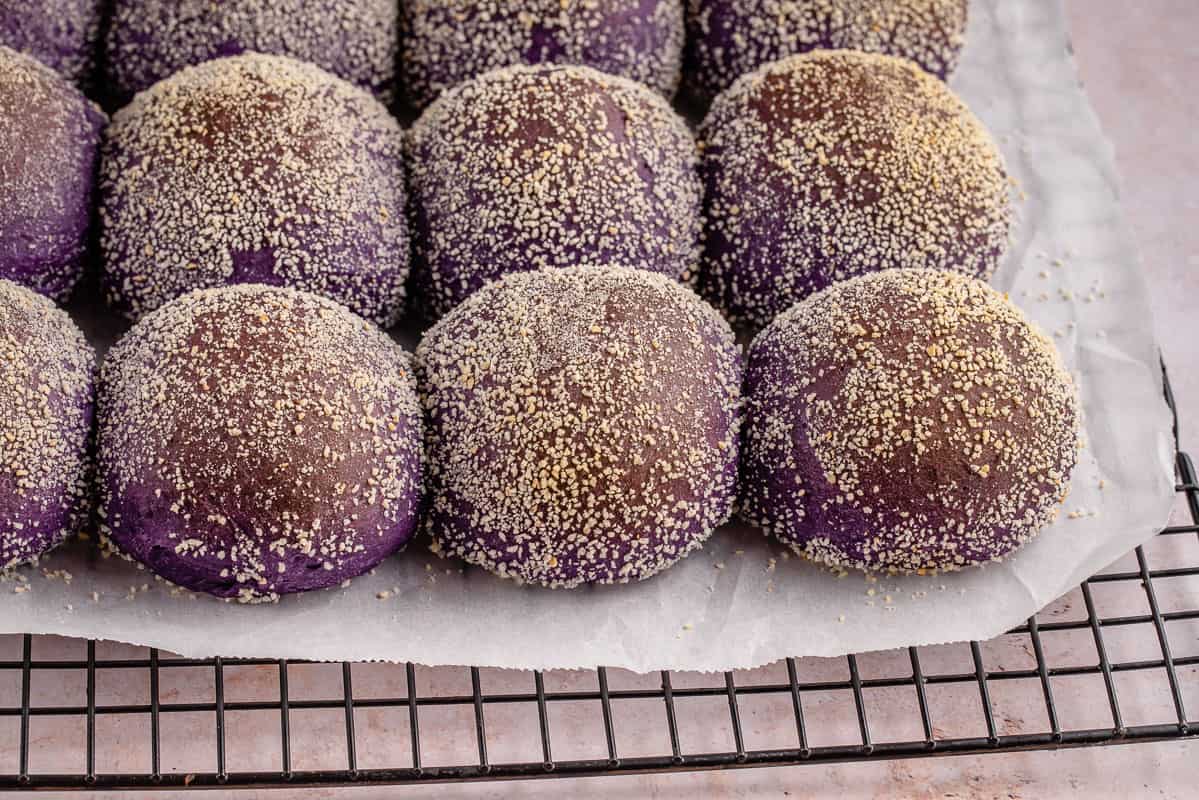
Equipment
- Mixing Bowls
- Measuring Cups
- Baking Sheet or Large Baking Dish
- Clean Kitchen Towel or Plastic Wrap
- Kitchen Scale (optional)
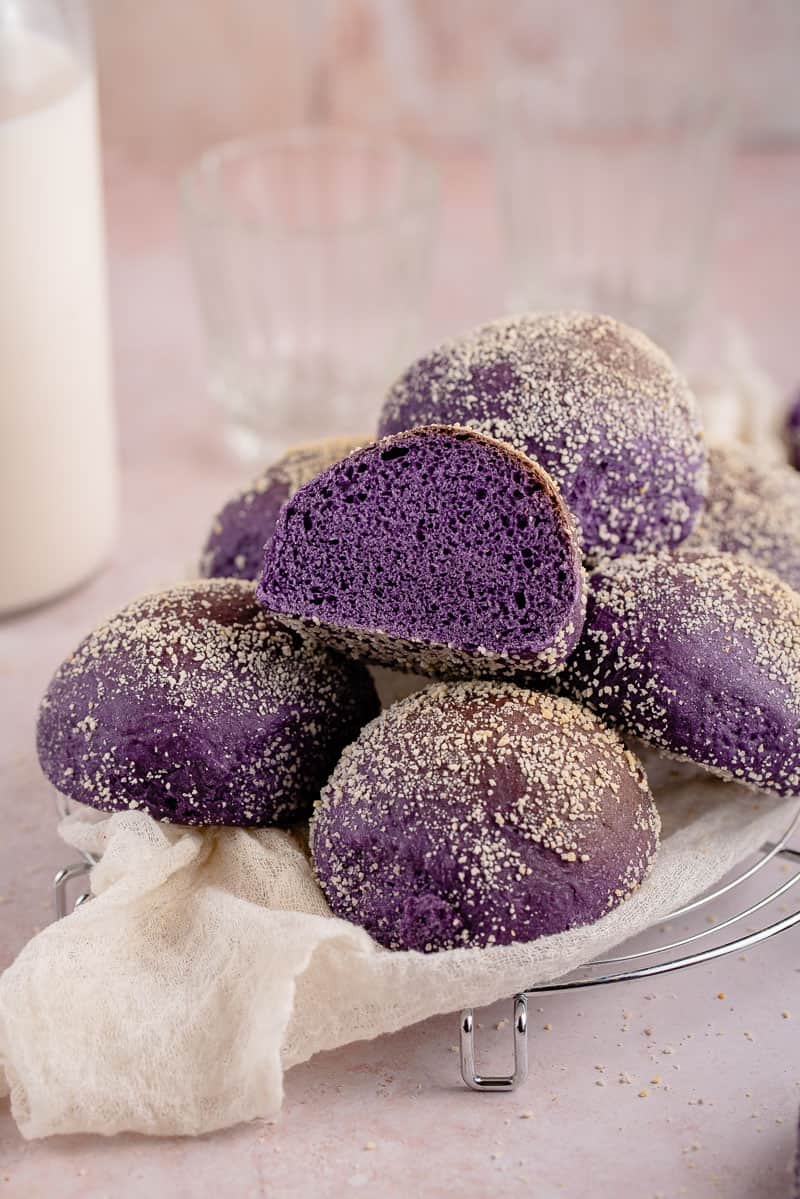
If you enjoyed this ube pandesal recipe, you might also like:
Print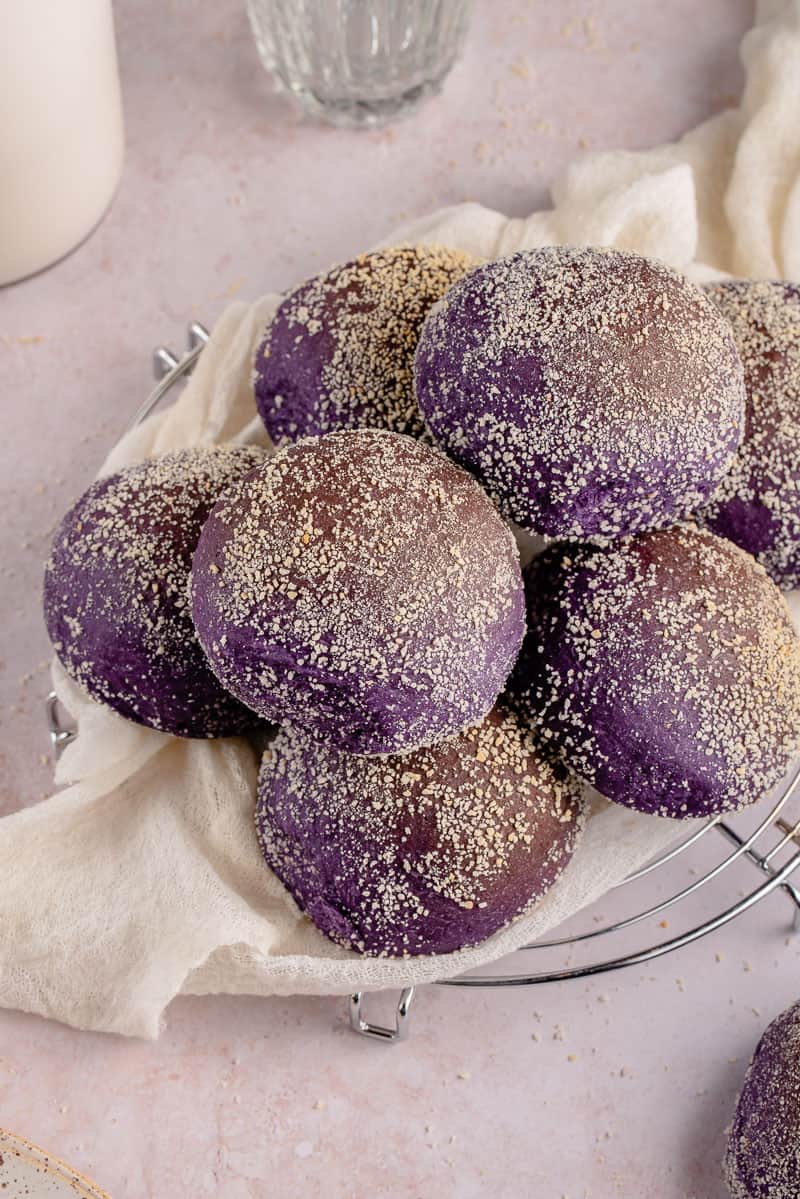
Fluffy Ube Pandesal (Filipino Purple Yam Bread Rolls)
- Author: Jasmine @ Sweet Simple Vegan
-
 Total Time: 2 hours 52 minutes
Total Time: 2 hours 52 minutes -
 Yield: 20 rolls
Yield: 20 rolls - Diet: Vegan
Description
A Filipino breakfast staple made vegan! This ube pandesal recipe is soft, fluffy, and delicious. Pandesal is great any time of day and can be enjoyed on its own or with sweet or savory fillings.
Ingredients
Wet Ingredients
- 1/2 cup lukewarm water
- 1 teaspoon granulated sugar
- 2 1/4 teaspoons active dry yeast
- 6 tablespoons vegan butter, melted
- 2 cups warm unsweetened plant-based milk
- 1 1/2 tablespoons ube extract (ube flavoring)
Dry Ingredients
- 6 cups (816g) all-purpose flour
- 3/4 cup granulated sugar
- 1/2 cup (98g) ube powder
- 1 teaspoon salt
- 1/2 cup plain and fine bread crumbs (be sure they are vegan)
Equipment
- Mixing Bowls
- Measuring Cups
- Baking Sheet or Large Baking Dish
- Clean Kitchen Towel or Plastic Wrap
- Kitchen Scale (optional)
Instructions
- In a large cup, mix the lukewarm water and 1 teaspoon of sugar until dissolved. Add in the active dry yeast and gently mix it to combine. Set this mixture aside for 5-10 minutes to activate. You will know it is ready when it is fluffy!
- In a medium bowl, mix the melted butter, warm milk, and ube extract. Set aside.
- In a large mixing bowl (or the bowl of your standing mixer), add in the flour, remaining 3/4 cup of sugar, ube powder, and salt. Mix until well combined.
- Add in the yeast mixture and the milk mixture. Mix together until a dough forms. On a lightly floured work surface or with a standing mixer, knead the dough until it is smooth and elastic, about 8-10 minutes.
- Grab another large bowl and lightly coat it with oil. Transfer the dough to the oiled bowl, toss it around a bit to be sure it is moist, and cover it with a clean and damp kitchen towel or plastic wrap. Allow the dough to rise in a warm area for 1 hour or until doubled in size. We rise ours in the oven with the oven light on (no heat!).
- In the meantime, get your baking dish ready. You can use either a lined baking sheet with parchment paper or a silicone mat, or you can grease a few small glass or metal baking dishes (enough to fir 20 pieces).
- Flour a clean work surface. Once the dough has risen, punch it down and transfer it to the work surface. Divide the dough into 20 even pieces. If you would like this to be extra precise, you can use a kitchen scale. Shape each dough into balls (see video for how we did ours).
- Add the breadcrumbs to a wide bowl or plate and gently coat each pandesal roll in the breadcrumbs. If the rolls are too dry to coat, you can spray them with cooking oil or water to moisten them up. Transfer the rolls into the prepared dish, reasonably close together (about 1/2″ apart), to help them fluff up as they bake.
- Cover the pan(s) with a clean cloth or plastic wrap and place them in a warm place to rise for 1 hour or until doubled in size. We rise ours in the oven with the oven light on (no heat!).
- Preheat the oven to 375°F. If you are rising the dough in the oven, be sure to remove them before preheating! Bake the rolls for 20 to 23 minutes, or until golden. Cool for 10 minutes before serving and enjoy.
Notes
- If you would like sweeter pandesal, increase the sugar to 1 cup.
- This can also be made in a stand mixer with a dough hook.
- Coconut sugar can be used in place of granulated sugar, but keep in mind that it will create a darker dough/result.
- If you want to make the dough ahead of time, you totally can! Here are two options:1. When you reach step 6, cover the bowl with plastic wrap or a resealable wrap instead of allowing the dough to rise and then place it into the fridge overnight. Remove the dough from the refrigerator, let it come to room temperature, and continue rising (about 1-1.5 hours or so). Once it has come to room temperature, continue with the recipe.2. The second option is to place the dough into the fridge after step 9. Place the rolls onto your pan of choice, cover the pan and place it into the refrigerator overnight. Remove the dough from the refrigerator and allow it to come to room temperature, continue rising (about 1-1.5 hours or so), and continue with the recipe.
- To substitute instant (or rapid rise) yeast for active dry, use 1 3/4 teaspoons of instant yeast instead of 2 1/4. You do not need to prove the yeast; add it to the dry ingredients. You will need to add more liquid to the dough to get it smooth, about 1/2 cup.
-
 Prep Time: 2 hours 30 minutes
Prep Time: 2 hours 30 minutes
-
 Cook Time: 22 minutes
Cook Time: 22 minutes
-
 Category: Breakfast, Bread
Category: Breakfast, Bread
-
 Method: Oven
Method: Oven
-
 Cuisine: Filipino
Cuisine: Filipino
Keywords: filipino, bread, rolls, breakfast, snack, ube
Disclaimer: This page may contain affiliate links, which simply means that we earn a commission if you purchase through those links, but your price remains the same. Thank you for supporting Sweet Simple Vegan!
The post Fluffy Ube Pandesal (Filipino Purple Yam Bread Rolls) appeared first on Sweet Simple Vegan.

